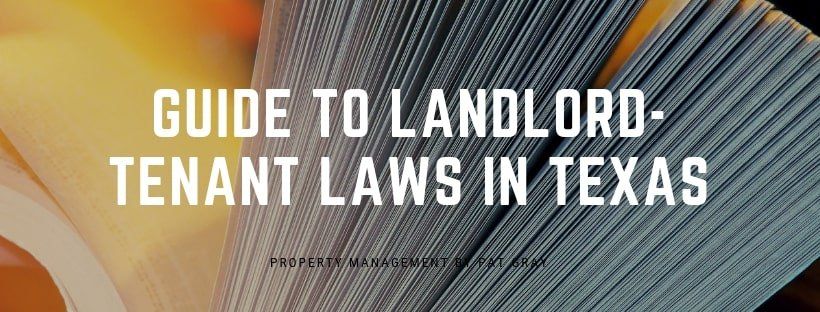Guide to Landlord-Tenant Laws in Texas
Maintaining a good landlord-tenant relationship is not always an easy task. Landlords have a certain expectation of their tenants, just as tenants have expectations of you, as the landlord. Sometimes these expectations and obligations aren’t met, which can lead to some messy situations.
In order to prevent conflicts, it’s important for each party of the Texas lease agreement to understand the basics of the law. By doing your research, each party will be able to deal with many legal questions and problems without needing a lawyer.
If you are a Texas landlord or tenant, here is the guide to the landlord-tenant laws that you should know about.
Basics of the Texas Rental Laws
Required Landlord Disclosures in Texas
With every new tenancy, the Texas landlord-tenant law requires landlords to notify tenants of certain things.
Typically, in writing, such disclosures include:
- Electric service interruption
- Towing or parking rules and policies
- Renter’s rights when a landlord fails to repair
- Domestic violence victims’ rights
- Rules for the return of security deposits
- Security device requests
- Owner or agent identity
Texas Security Deposit Limit and Return
Texas landlords must follow certain laws when it comes to handling a renter’s security deposit. Failure to do so and they could forfeit their right to keep any portion of the deposit.
Common questions about Texas rental laws regarding security deposits include:
- Is there a security deposit limit?
- How should landlords store a tenant’s security deposit?
- Do Texas landlords need to notify renters upon receiving their security deposit?
- Can landlords keep a portion of the renter’s security deposit?
- When should the landlord return the tenant’s security deposit?
- Can a landlord charge a non-refundable fee?
- What happens to the tenant’s security deposit in case property ownership changes?
Small Claims Lawsuits in Texas
The purpose of the small claims court is to quickly and fairly resolve minor disputes. In addition, it is a cost-effective procedure.
Examples that would result in small claims court include a renter suing the landlord in court for discrimination, or a landlord suing the tenant for excessive property damage. There is, however, a limit to the amount a person can sue for in the court. In Texas, the amount limit is $10,000.
Filing in small claims court generally costs around $35, but you can include that in the claim amount against the other party.
Texas Tenant Rights to Withhold Rent
Texas renters have the right to live in a habitable property. That is, one that meets the basic safety, health, and structural standards and is in a good state of repair. For more information on Texas’ housing laws click here.
If the landlord fails to do this, the Texas landlord-tenant law provides the renter with several options. Tenants have the right when it comes to repairs to “repair and deduct.” In other words, the renter has the option to fix the issues and then deduct the cost from the rent.
However, before using this option, renters are advised to check whether their circumstances meet the state’s requirements.
Texas Termination and Eviction Rules
The lease agreement gives a Texas tenant certain fundamental rights. For example, the landlord can’t simply wake up one morning and ask them to leave the property. The landlord also cannot raise rent without any justifiable reason. The only exception is if the lease or rental agreement allows it.
For a landlord to evict a tenant in the state of Texas, they must have a valid reason. For instance, a gross violation of the lease agreement by the tenant. Even then, the landlord must go through the formal eviction process.
Landlord Access to Rental Property
Texas Landlords reserve the right to enter a tenant’s property. Tenants, on the other hand, reserve the right to a quiet and peaceful enjoyment of their property.
To ensure that neither right is violated, both parties must agree on the accessibility of the premises. It is the landlord’s responsibility to give adequate notice while ensuring that the entry times are within reason. On the tenant’s part, they must not deny the entry if the request is reasonable.
There you have it. The guide to the landlord-tenant laws in Texas. If you have more questions or seek more clarifications, please consult a local property management company or a qualified Texas landlord-tenant attorney.
Posted by: Pgrayreal on October 23, 2018
Posted in: Uncategorized







